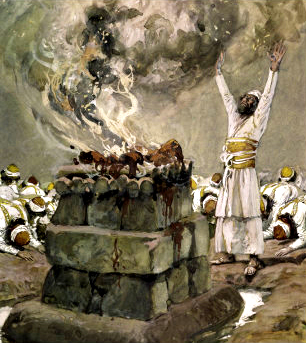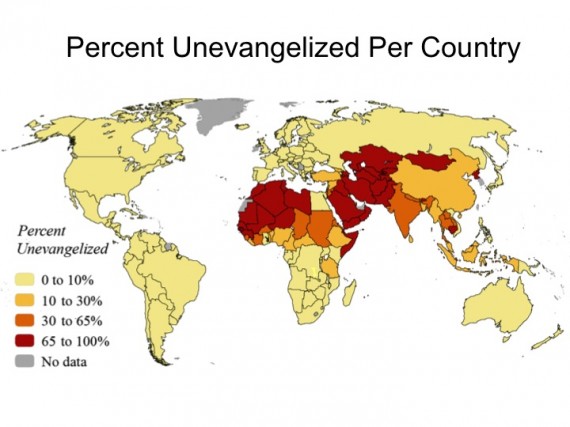You don’t have to believe the entire gospel to receive eternal life. And even if you believed in the gospel, you might not be saved.
Do such statements shock you?
They should—especially if you hold to one of the traditional (yet not so biblical) definitions for the words “gospel” and “saved.”
When most people today hear the sentence “You must believe the gospel to be saved” what actually goes through their mind is this: “Here are the things you must believe in order to go to heaven when you die” (And of course, everyone has a different idea about what we must believe).
So people are often shocked to learn that the biblical word “gospel” (Gk., euangelion) means way more than what a person need to believe to receive eternal life. Similarly, the biblical word for “salvation” (Gk., sōteria) has very little to do with going to heaven when you die.
To see what each word means, we will look at the word “gospel” in the next couple posts, and the word “salvation” in a few posts after that.

The Definition of “Gospel”
The word “gospel” means “good news.”
And although “gospel” almost universally today refers to good news about forgiveness of sin and the offer of eternal life through Jesus Christ, the word itself carries no such connotations.
In ancient and biblical times, the word is often used regarding things like children who recovered from sickness, a battle which was won, or a successful trading voyage (See my article on the gospel where I document this in more detail).
Just as the words “good news” can refer to almost any sort of happy event or positive outcome today, so also, the words “good news” or “gospel” could refer to almost anything good in biblical times as well.
In the New Testament itself, though, the phrase “good news” or “gospel” has a more focused meaning.
 Though it can sometimes refer simply to an encouraging message (1 Thess 3:6), and Jesus often used the term to describe the coming of the Kingdom of God (cf. Matt 4:23; 9:35), Paul is the one who used the word in his writings, and he uses the word most often in reference to describe the complete chain of events regarding what God has done for sinful humanity through Jesus Christ to provide eternal life for them.
Though it can sometimes refer simply to an encouraging message (1 Thess 3:6), and Jesus often used the term to describe the coming of the Kingdom of God (cf. Matt 4:23; 9:35), Paul is the one who used the word in his writings, and he uses the word most often in reference to describe the complete chain of events regarding what God has done for sinful humanity through Jesus Christ to provide eternal life for them.
And when I write “the complete chain of events” I mean the complete chain, beginning with God eternal love for humanity, including the creation of mankind and their subsequent fall, and going through God’s calling of Israel, His work through them during their checkered history, the birth, life, ministry, death, resurrection, and ascension of Jesus, and looking forward to the return of Jesus and the new heavens, the new earth, and our eternal existence with God. The biblical “gospel” includes all of this. Every bit.
While the term gospel is a non-technical term for any good news, the NT usage seems to define it as good news for everybody, whether Jew or Gentile, believer or unbeliever, regarding the benefits and blessings which come to us from the person and work of Jesus Christ. It includes everything from “the eschatological expectation, the proclamation of the [kingdom of God] … the introduction of the Gentiles into salvation history, [and] the rejection of the ordinary religion of cult and Law.” This gospel contains everything related to the person and work of Jesus Christ, including all of the events leading up to His birth, and all the ramifications from Christ’s life, death, and resurrection for unbelievers and believers. (see p. 50 of my article on the gospel).
So what is the gospel? It is everything about Jesus.
So do you see why you don’t have to believe “the gospel” to receive eternal life? The reason is because you cannot believe everything about Jesus. It’s impossible to know everything about Jesus, let alone believe everything (we will talk about Mark 1:15 in a later post). To receive eternal life, you simply believe in Jesus for it (John 3:16; 5:24; 6:47, etc.). This is a truth within the gospel, but is not itself “the gospel.”
 Want to learn more about the gospel? Take my new course, "The Gospel According to Scripture."
Want to learn more about the gospel? Take my new course, "The Gospel According to Scripture."
The entire course is free for those who join my online Discipleship group here on RedeemingGod.com. I can't wait to see you inside the course!





 It was the same for the Israelites. The Mosaic Law was to maintain peace, order, security, and safety. Because Israel was intended to be a theocracy, there were also numerous laws related to the worship of God, but again, these were not intended to grant a person eternal life, but simply to maintain fellowship with other members of the Israelite community.
It was the same for the Israelites. The Mosaic Law was to maintain peace, order, security, and safety. Because Israel was intended to be a theocracy, there were also numerous laws related to the worship of God, but again, these were not intended to grant a person eternal life, but simply to maintain fellowship with other members of the Israelite community. Note that this level of revelation might be different for different people of different ages and of different mental capacities.
Note that this level of revelation might be different for different people of different ages and of different mental capacities.
 It is often taught that Jesus obeyed the law perfectly because we cannot. Then we are told that when we believe in Jesus for eternal life, He give us His righteousness. He has such an infinite supply of righteousness, that He can pour some of it into us so that we also become righteous.
It is often taught that Jesus obeyed the law perfectly because we cannot. Then we are told that when we believe in Jesus for eternal life, He give us His righteousness. He has such an infinite supply of righteousness, that He can pour some of it into us so that we also become righteous.
 Social justice has been a controversial topic in Christian circles for several decades. Part of the controversy is whether or not Jesus taught His followers to practice social justice.
Social justice has been a controversial topic in Christian circles for several decades. Part of the controversy is whether or not Jesus taught His followers to practice social justice. A full explanation would take a full book, but let me see if I can summarize three of the highlights:
A full explanation would take a full book, but let me see if I can summarize three of the highlights: So when it comes to Jesus and His Gospel message, I don’t think He would side with either of the two main groups in the social justice debate.
So when it comes to Jesus and His Gospel message, I don’t think He would side with either of the two main groups in the social justice debate.
 Yesterday I needed to pick up a couple of things at Costco. Since I had a little extra time, I visited all of the free food sample tables. I even tried a few of the samples, but mostly I talked to the people working the sample tables.
Yesterday I needed to pick up a couple of things at Costco. Since I had a little extra time, I visited all of the free food sample tables. I even tried a few of the samples, but mostly I talked to the people working the sample tables. Standing near the door where he entered, I greeted him. He said “God bless you.” Homeless people frequently tell me that, so I didn’t think much about it. I headed to the kitchen where I was preparing ice cream for the break, and the homeless man appeared to be heading for the door.
Standing near the door where he entered, I greeted him. He said “God bless you.” Homeless people frequently tell me that, so I didn’t think much about it. I headed to the kitchen where I was preparing ice cream for the break, and the homeless man appeared to be heading for the door. Want to be the church in your community but don't know? Here are some posts which not only explain what it means to be the church in your community, but also gives concrete, practical examples of what it looks like and how to be the church whatever you do and wherever you go.
Remember, you ARE the church, and wherever you go, Jesus goes with you!
Want to be the church in your community but don't know? Here are some posts which not only explain what it means to be the church in your community, but also gives concrete, practical examples of what it looks like and how to be the church whatever you do and wherever you go.
Remember, you ARE the church, and wherever you go, Jesus goes with you!
